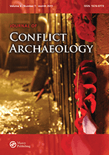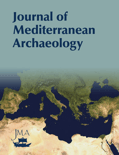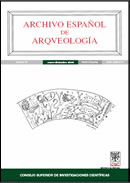
Journal of Conflict Archaeology
Scope & Guideline
Advancing Understanding: Archaeology's Role in Conflict Studies
Introduction
Aims and Scopes
- Conflict and Military Archaeology:
The journal primarily focuses on archaeological investigations related to military conflicts, including battlefields, fortifications, and military installations from various historical periods. - Interdisciplinary Approaches:
Research published in the journal employs a range of methodologies, integrating techniques from anthropology, history, geography, and environmental science to enrich the understanding of conflict-related archaeological sites. - Material Culture Studies:
The journal emphasizes the study of material culture and artifacts associated with conflicts, examining how these items inform us about the social, political, and economic aspects of warfare. - Heritage and Preservation:
There is a consistent focus on the preservation of conflict heritage, highlighting the importance of safeguarding sites and artifacts that bear witness to historical events and their implications. - Global Perspectives:
The journal encourages a wide geographical focus, publishing studies from various regions and contexts, thus fostering a global understanding of conflict archaeology.
Trending and Emerging
- Technological Integration in Archaeology:
There is a rising trend in the use of advanced technologies such as drone photogrammetry, LiDAR, and geophysical methods to investigate conflict sites, showcasing innovation in archaeological methodologies. - Contemporary Conflict and Heritage Issues:
Research focusing on recent conflicts and their impact on tangible heritage is gaining importance, particularly in light of ongoing global conflicts and the need to understand their implications for cultural heritage preservation. - Bioarchaeology and Human Remains:
An increased focus on bioarchaeological studies, particularly related to burials from conflicts, reflects a growing interest in the human impact of warfare and the ethical considerations surrounding the treatment of human remains. - Interdisciplinary Collaborations:
There is a notable trend towards interdisciplinary research that combines archaeology with sociology, anthropology, and political science, emphasizing the complex socio-cultural dimensions of conflict. - Public Engagement and Battlefield Tourism:
Emerging themes also include the exploration of battlefield tourism and public engagement with conflict heritage, highlighting the role of archaeology in shaping collective memory and public understanding of historical conflicts.
Declining or Waning
- Prehistoric Conflict Studies:
There has been a noticeable reduction in studies focusing solely on prehistoric conflicts, as more recent research tends to emphasize historical and modern conflicts, reflecting a shift towards contemporary relevance. - Traditional Warfare Analysis:
Research focusing on traditional forms of warfare, such as ancient battles and tactics, has decreased, possibly due to a growing interest in the social and cultural dimensions of conflict rather than just military strategies. - Local Conflicts in Less Studied Regions:
There appears to be a waning interest in localized conflicts in less researched areas, as the journal increasingly prioritizes more globally recognized conflicts and their archaeological implications. - Niche Historical Events:
Studies on niche historical events or lesser-known conflicts have become less frequent, suggesting a shift towards more impactful and widely recognized conflicts that resonate with contemporary issues.
Similar Journals

Journal of Mediterranean Archaeology
Illuminating the Past, Shaping the Future of ArchaeologyThe Journal of Mediterranean Archaeology, published by EQUINOX PUBLISHING LTD in the United Kingdom, is a premier academic journal dedicated to the exploration and dissemination of knowledge within the vibrant field of Mediterranean archaeology. Established in 1988, this journal has consistently demonstrated its commitment to scholarly excellence, attaining a Q1 ranking in various categories, including Archaeology and Arts and Humanities, making it a vital resource for researchers and students alike. With a prominent Scopus rank of #49 out of 413 in Archaeology, it places itself among the top-tier publications, reflecting its impact and relevance in contemporary archaeological discourse. Although the journal is not open access, its rigorous peer-review process ensures the publication of high-quality scholarly articles that contribute significantly to the understanding of the diverse cultural narratives within the Mediterranean region. As the journal moves toward its 35th anniversary, it continues to be a cornerstone for professionals seeking to share groundbreaking research and dialogue in this critically important area of study.

Conimbriga-Revista de Arqueologia
Unlocking the Secrets of the Past, One Article at a TimeConimbriga-Revista de Arqueologia is a distinguished open-access journal dedicated to the field of archaeology, published by COIMBRA UNIVERSITY PRESS. Since its inception, the journal has fostered a vibrant intellectual community focused on the exploration and dissemination of archaeological research, particularly emphasizing studies relevant to the rich historical and cultural heritage of Portugal and beyond. With its open access model established in 2014, it has become a vital resource for researchers, professionals, and students to share their findings without access barriers, encouraging collaboration and knowledge exchange. Despite the absence of specific metrics such as the HIndex and Scopus rankings, the journal is recognized for its commitment to high-quality scholarship and its role in advancing archaeological discourse. Positioned within the scholarly landscape, Conimbriga-Revista de Arqueologia serves as a crucial platform for the publication of innovative research, reviews, and critical essays, making it an essential journal for those invested in the archaeological sciences.

Annales Instituti Archaeologici
Pioneering Research that Illuminates Our Ancient HeritageAnnales Instituti Archaeologici is a distinguished journal published by INST ARHEOLOGIJU, dedicated to advancing research in the field of archaeology. With an ISSN of 1845-4046 and an E-ISSN of 1848-6363, this journal serves as a vital platform for the dissemination of innovative archaeological studies and findings, reflecting the evolving trends and methodologies in this fascinating discipline. Based in Croatia, the journal captures a global audience, emphasized by its Q3 ranking in both Archaeology categories as per the latest 2023 metrics, indicating a solid presence in the academic landscape. Although it does not currently offer Open Access options, its impactful contributions are recognized through its Scopus ranks, where it stands at #137/413 in Archaeology related to Arts and Humanities and #135/354 in Social Sciences. Researchers, professionals, and students interested in the latest archaeological research and its applications will find Annales Instituti Archaeologici to be an invaluable resource, promoting knowledge and fostering scholarly communication within the archaeological community.

International Journal of Historical Archaeology
Fostering Interdisciplinary Dialogue: Shaping the Future of Archaeological ResearchInternational Journal of Historical Archaeology, published by SPRINGER, stands at the forefront of archaeological scholarship, focusing on the intricate relationship between historical events and archaeological findings. With an impressive impact factor underscored by its ranking in the Q1 quartiles across various categories, including Archeology and History, this journal serves as a premier platform for researchers, professionals, and students alike to disseminate groundbreaking findings and theoretical advancements in the field. Although it is not an Open Access publication, the journal provides valuable insights through its rigorous peer-review process, enhancing the quality of contributions. Covering a breadth of topics from 1997 to 2024, it is vital for advancing knowledge in historical archaeology and offers an essential resource for those invested in understanding our shared past through the lens of material culture. The journal's commitment to fostering interdisciplinary discussions enriches the scholarly community and supports the evolution of methodologies and perspectives within the domain.

Revue Archeologique du Centre de la France
Bridging the Past and Present of Central France's Archaeological StudiesRevue Archeologique du Centre de la France is a prestigious academic journal dedicated to the field of archaeology, with a special focus on the rich historical and cultural heritage of central France. Published by FED EDITION REVUE ARCHEOLOGIQUE CENTRE FRANCE, this journal has been an open-access platform since 2004, ensuring that researchers, professionals, and students can freely access cutting-edge archaeological findings and scholarly discussions. With an acute emphasis on disseminating knowledge and fostering ongoing dialogue in archaeology, Revue Archeologique du Centre de la France serves as a vital resource for those keen to explore the complexities of French archaeological studies. Housed in Tours, this journal not only highlights regional heritage but also situates it within broader archaeological frameworks, making it an essential contribution to the field. Researchers can look forward to engaging with a diverse array of articles that cover both theoretical and applied aspects of archaeology, bolstering the understanding of our shared past.

Bulgarsko e-Spisanie za Arkheologiya-Bulgarian e-Journal of Archaeology
Connecting scholars to the past, present, and future of archaeology.Bulgarsko e-Spisanie za Arkheologiya - Bulgarian e-Journal of Archaeology is a prominent open-access journal published by the ASSOC BULGARIAN ARCHAEOLOGISTS since 2011, serving as a vital platform for the dissemination of archaeological research and findings in Bulgaria and beyond. With the ISSN 1314-5088, this journal is dedicated to advancing knowledge in the field of archaeology, facilitating the sharing of innovative studies, fieldwork results, and theoretical discussions. It is particularly significant for researchers, professionals, and students who are interested in the archaeological heritage of Bulgaria, providing an accessible venue for high-quality scholarly contributions. The journal's commitment to open access ensures that its rich repository of knowledge is available to a global audience, enhancing collaboration and fostering new discoveries within the discipline.

Cuadernos de Prehistoria y Arqueologia-Universidad Autonoma de Madrid
Illuminating Cultural Heritage Through ResearchCuadernos de Prehistoria y Arqueologia-Universidad Autonoma de Madrid is a distinguished academic journal dedicated to the fields of archaeology and prehistory, published by the Universidad Autonoma de Madrid, Departamento de Prehistoria y Arqueología. With an ISSN of 0211-1608, this journal plays a crucial role in disseminating significant research findings and theoretical advancements within these domains. Recognized for its scholarly excellence, it holds impressive quartile rankings in 2023, including Q2 in Archaeology and Q1 in History, reflecting its high impact within the academic community. While currently not an open-access publication, Cuadernos de Prehistoria y Arqueologia provides valuable insights to researchers, professionals, and students engaged in the exploration of human history and cultural heritage from 2018 to 2024 and beyond. With a commitment to fostering interdisciplinary dialogue, this journal serves as an essential platform for innovative studies and comprehensive reviews, contributing to the advancement of knowledge in archaeology and prehistory.

Mediterranean Archaeology & Archaeometry
Connecting Scholars Across Mediterranean NarrativesMediterranean Archaeology & Archaeometry is a premier academic journal dedicated to advancing the fields of archaeology, anthropology, conservation, and history, published by UK Zhende Publishing Ltd. With its ISSN 1108-9628 and E-ISSN 2241-8121, this journal serves as a vital platform for scholars and practitioners to disseminate innovative research and findings related to the rich archaeological heritage of the Mediterranean region. It has gained remarkable recognition, achieving a Q2 ranking in anthropology and archaeology, and a Q1 classification in several categories including arts and humanities, conservation, and history as of 2023. Its impressive Scopus rankings underscore its impact, with a significant position in history (59/1760) and conservation (11/103) disciplines. Spanning years from 2008 to 2022, the journal invites open access contributions to foster collaboration and interdisciplinary dialogue among researchers, students, and professionals alike, making it an indispensable resource for those engaged in the exploration and preservation of historical narratives within the Mediterranean context.

California Archaeology
Revealing the Past: Insights from California's Archaeological LandscapeCalifornia Archaeology is a premier academic journal dedicated to the multifaceted study of archaeology within the context of California's rich historical and cultural landscape. Published by Routledge Journals, Taylor & Francis Ltd, this journal conveys cutting-edge research from 2009 to 2024 and is recognized for its impact in the field, with a commendable Q2 ranking in both archaeology and arts and humanities as of 2023. Scholars and practitioners are encouraged to disseminate their findings and insights through this journal, contributing to a deeper understanding of archaeological practices and interpretations in California. With access options designed to enhance the visibility of research, California Archaeology serves as an essential resource for professionals, students, and researchers devoted to advancing knowledge in archaeology, making it a cornerstone of academic discourse in the discipline.

Archivo Espanol de Arqueologia
Exploring the depths of history, one discovery at a time.Archivo Español de Arqueología is a prestigious journal published by the Consejo Superior de Investigaciones Científicas (CSIC), dedicated to the field of archaeology and the historical sciences. Since its transition to Open Access in 1991, this journal has been a significant resource for scholars and practitioners in Spain and beyond, ensuring the dissemination of high-quality research to a broad audience. With an impressive Scopus ranking that places it within the top 20% of journals in the disciplines of History and Archaeology, Archivo Español de Arqueología plays a crucial role in advancing academic discourse and promoting innovative archaeological methodologies. The journal has maintained rigorous standards, reflected in its placement within the Q2 and Q3 quartiles, enabling it to establish a reputation for excellence and reliability in archaeological scholarship. Researchers, professionals, and students are encouraged to explore the journal's diverse array of articles from its foundation year of 2009 to the present, enriching their understanding of the past through the latest findings and theoretical advancements in archaeology.